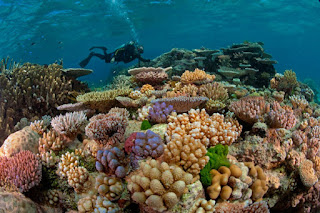 |
| Garbage the size of Texas: Click on Image |
You can question global warming, if you want to be perverse and you can believe President Obama was born in Kenya and raised on Mars, but it is hard to deny the persistent pestilence of plastic bags and bottles in the oceans of the planet, or, if you don't want to believe photos of the ocean, which, it must be admitted might have been photo shopped in the same studio where they faked all those moon landings, but you can simply walk around New York City and even Hampton, and see plastic bags in the trees, and on the beaches.
It is true, plastic bags and detritus on Hampton beaches are relatively minimal scourges compared to beaches in places like Barbados and other places where currents concentrate the garbage.
But, the thing is, with minimal effort even someone as unorganized as I can manage to keep a few cloth bags in my car to be used at Market Basket and Hannafords and Walgreens and Home Depot. I can do it. How much effort does it take to take a small step to save the planet and some struggling fish and sea turtles?
 |
| Jacques Cousteau saw it first |
The article in this week's New Yorker about Jennie Romer, the New York City lawyer who is trying to get a law passed to impose a 5 cent charge for plastic bags at all New York City stores is a reminder we, each of us, can do more to save the planet.
 |
| Jennie Romer, Esq |
It turns out plastic bags are simply not recyclable, in the real world. They are not put through machines except in a very few places, like San Francisco. They break down into deadly blobs and float around the ocean. Or they wash up on beaches. Their fellow travelers are plastic bottles, which are even more obnoxious, if less numerous.
In Hannaford's today, I saw the ubiquitous plastic bags at every cash register, as they are at every other store, from Walgreens to the Dollar Store. It seems counter intuitive that by simply adding a 5 cent charge for the bag could possibly undo all this plastic bag infrastructure, but, apparently, it's worked in San Francisco. But the other thing is San Francisco has invested in the hardware to actually destroy the plastic bags. Hard to imagine New Hampshire being willing to spend money on this.
In Italy, I saw women walking home from the markets carrying food in net bags--no automobiles, no plastic bags, in Italy.
We always brag about how superior we are here in the United States of America. Why can't we do what the Italians do, every day, to be less destructive of our planet?
 |
| Sea Otters |
Having written this screed, I began to notice just how ubiquitous plastic is, starting with my refrigerator. Everything from milk, to yogurt, to water is contained by plastic throw aways. Clothes from the laundry is wrapped in plastic. Every tool in the hardware store comes wrapped in plastic, as do all electric devices from ear phones to I pods. Even if we eliminated plastic bags, we would be awash in plastic. Of course, the bags are particularly nasty because they are so light, they blow in the wind into trees and lakes and oceans, but it strikes me, we ought to really be talking about doing what San Francisco has done--invested in the big machines which really do melt this stuff down into some less toxic form. Solutions likely will prove more complicated, but expense should not be a problem--the people who made glass bottles once had to pay for the collection of these items. No reason the people who make plastic things should not bear the cost of disposing of them.



































